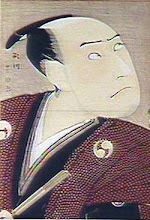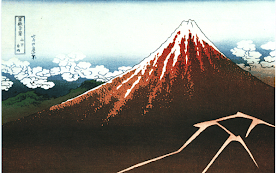As Chairman Kaga would say, if memory serves me correctly, out of the two hundred fifty some times I have been hospitalized (such an odd word—sounds like I was made into a hospital, but I digress) I have only been in an ambulance twice.
When I think about it, and about five minutes ago was the first time, I can come up with several reasons. When I was young the town's ambulance was driven by the operator of one of the local funeral homes. As dedicated as he probably was, it was still a bit iffy getting in touch with him, and then there was the expense of a forty-five mile trip to the University Hospitals. Despite what Mr Limbaugh may think or spout, cost is a very limiting factor when the poor are attempting to get health care. Add to that the fact that my parents, I think correctly, felt they could in most cases get me to Ann Arbor far more quickly than an ambulance would.
To be honest, there was usually no need for the dramatic speeds and sirens of an ambulance. I know that the popular press, and even more learned sources who should know better, usually give the impression that even a pin prick or slightest bump will unleash a veritable torrent of blood washing away whole villages and leaving the little boy lifeless in seconds. Dentists refused to work on me because they were afraid I would bleed uncontrollably from the novocaine injections. Neither my brother nor I got the normal childhood vaccinations because the doctors were afraid they wouldn't be able to stop the bleeding.
Thankfully it doesn't work quite that way.
First, when we do our bleeding it isn't for speed. We aren't sprinters. Hemophiliacs are long distance bleeders. Endurance is our strong suit. We don't bleed any faster than anyone else, we bleed longer. That isn't to say that cuts aren't dangerous. They are. But their immediate danger is the same for us as with anyone else. If the average Joe or Jane would bleed to death in seconds or minutes, we will too. Otherwise you've got some time. It's that the pesky things sometimes won't stop bleeding that makes them such a problem.
Second, small cuts, and the needle punctures from injections, can often be controlled by mechanical means. A good bandage, or sometimes even just the natural pressure from the skin and muscle, will be enough to stop the bleeding, just like in a regular person. Amazing. Of course there are also those times when the damn thing just won't stop. Today an infusion or two of the factor of choice would soon have everything under control, but in the Fifties and Sixties that wasn't an option.
I knew one kid who lost the end of his finger because a cut wouldn't stop bleeding. His solution was to wrap a rubber band around his finger until it was tight enough to stop the blood flow, and then put a band-aid over it. A week or so later he was in the hospital, I think for an unrelated hemorrhage, and the doctors discovered the end of his finger was very much dead. It was a subtle reminder to the rest of us that tourniquets were not long term solutions.
To be somewhat fair to those frightened dentists, the inability to get a decent bandage inside the mouth was one of the reasons any kind of oral injury was always problematical. In fact, when I think back on the trips to the hospital before I was in junior high school, it seems like it was usually my mouth that was bleeding, or one of my knees.
My most thrilling ride (thrilling is as good a word as any for it, it scared my dad and I shitless) to the hospital was in the front seat of our car between Mom and Dad as Mom drove and Dad held a large coffee mug which I bled into. I had once again used the lower part of my face and a large piece of concrete to demonstrate some fundamental physical laws about a mass in motion coming to rest. Dad had already emptied the mug twice out the window by the time we were through Saline, and I had the distinct impression the left hand tires of our old secondhand Plymouth left the ground when we made the turn off of US-12 onto State Road. I know for a fact that as we were going up the normally pedestrian heavy section of State Street between South University Street and Liberty, Dad pleaded with Mom to slow down. Several students also had some passionate things to say to her as they leaped out of the way.
As for my two rides in an ambulance, the first occurred when I was twelve. The year I was in seventh grade, the first time, was not a real fun period. By the time the school year was over I had been in the hospital for all but twenty days of it. Since the state laws at the time demanded that a student attend an accredited school for at least forty days to qualify for advancement, I got to repeat the seventh grade. The hospital school, and my almost "B" overall grade (pretty good, I thought, considering) didn't count because the hospital school was not accredited. To give everything the proper touch of irony, the hospital school received its accreditation the following year.
Anyway, I had been in the hospital for several weeks for a hemorrhage which, as usual, I can't remember. On the day after I had come home what started out as a vague, uncomfortable feeling in my lower back had, by lunch time, turned into the worst pain I had ever experienced. As I got older, and more creative, I would have some hemorrhages that would equal, or surpass, this one, but at the moment it was the worst. I couldn't stand up or sit down, and lying down was also impossible.
Riding in our old Plymouth was clearly not an option, and Dad called the ambulance. To be honest, my memory begins to be real hazy here, but I have the impression of a large hearse-like car, except it seemed to be yellow with a white roof and a large red light on top. The encouraging hearse connotations were only enhanced by the driver being the local mortician. It was, like a hearse, clearly meant just to transport a person's body from one point to another.
The stretcher was brought in the front door, and the driver and Dad wheeled me out to the ambulance which was parked on our front lawn, close to our front door. I know, or think I know, or at least seem to remember that Dad rode in the back with me, and somewhere in the area a siren was wailing. The next thirty days are rather more vague.
For those wondering, I was told that I was apparently bleeding in the space between the kidney and the membrane that surrounds it. I don't recommend it.
The next time I was in an ambulance was about forty years later.
I had been feeling very run down. We had moved to Arizona just a short while before, and I had not yet been seen by my new doctor. After taking my shower that morning I was so weak I couldn't even dry myself, and fell onto the bed exhausted. After a while I called my boss and told her not to expect me that day, and then called my doctor. They said they would squeeze me in. After resting again I got dressed and my wife drove me to the doctor's office.
While I was filling out the new patent forms I was surprised to discover I couldn't remember how to spell my name, or where I lived. While I was still puzzling out those details they called my name. We got to the exam room, and the nurse nurse asked me to sit up while she took my blood pressure. I remember telling her I really had to lie down. After that there is this brief interlude where some people and I were sailing a boat somewhere sunny, and then a voice says, "He's got to be bleeding in his gut. You can smell the blood on his breath." That didn't sound right to me.
I opened my eyes, and there were about six people standing around me, and this guy with sailboats on his tie tells the nurse to call the ambulance and see if anyone was waiting for me in the lobby. I said my wife was out there—she could drive me home, and he said no, I had to go to the hospital. He really seemed to have his mind made up, and I was too tired to argue so I let him have it his way.
A few minutes later a couple paramedics were loading me into a large, box-like truck that had more medical equipment in it than many of the emergency rooms I had been in. As they drove the three blocks to the hospital one of the paramedics sat next to me taking my blood pressure over and over and asking me all kinds of questions about my name and where I lived and stuff. I didn't think it was an appropriate time for a pop quiz, but still managed to get several of the questions right.
That night they gave me six units of blood which got various numbers about halfway to where the doctor with the sailboats on his tie wanted them, and I was able to remember how to spell my name. I was rather proud of that.
About a month later, after a few endoscopic exams, a bit of surgery and a couple stints in ICU, they let me go home. It seems I had had an ulcer that had eaten its way into a, thankfully, small artery. Another thing I don't recommend very highly.
08 January 2010
Subscribe to:
Post Comments (Atom)










No comments:
Post a Comment